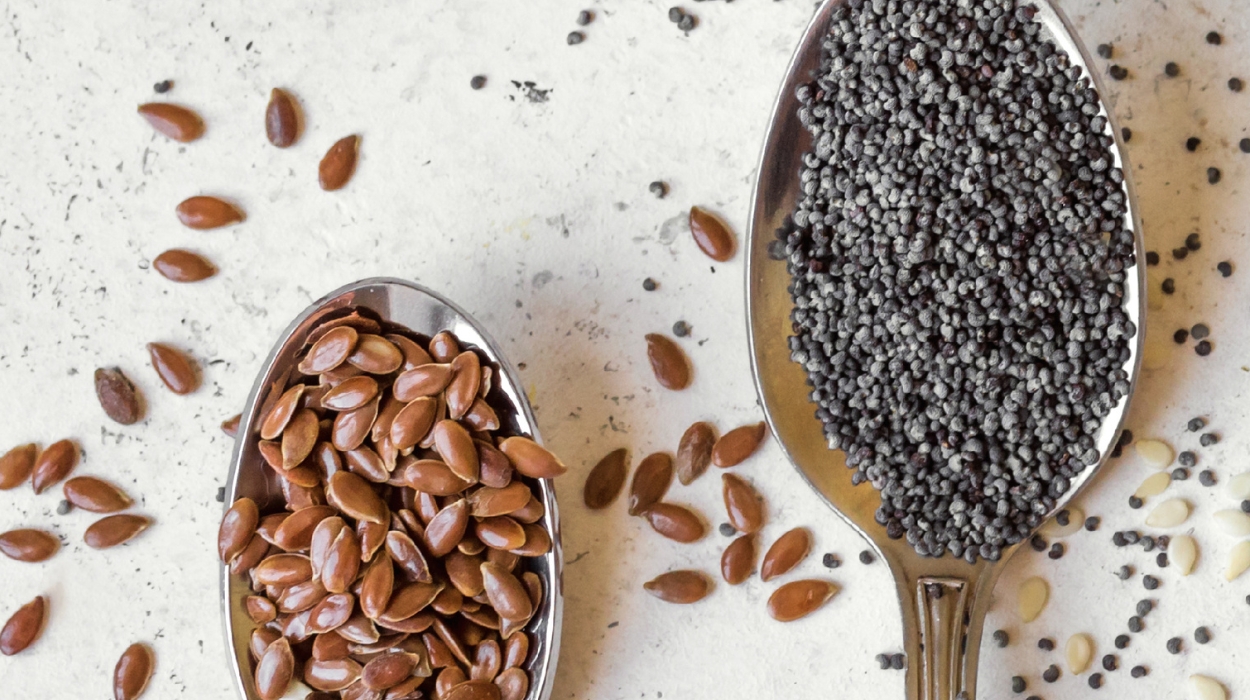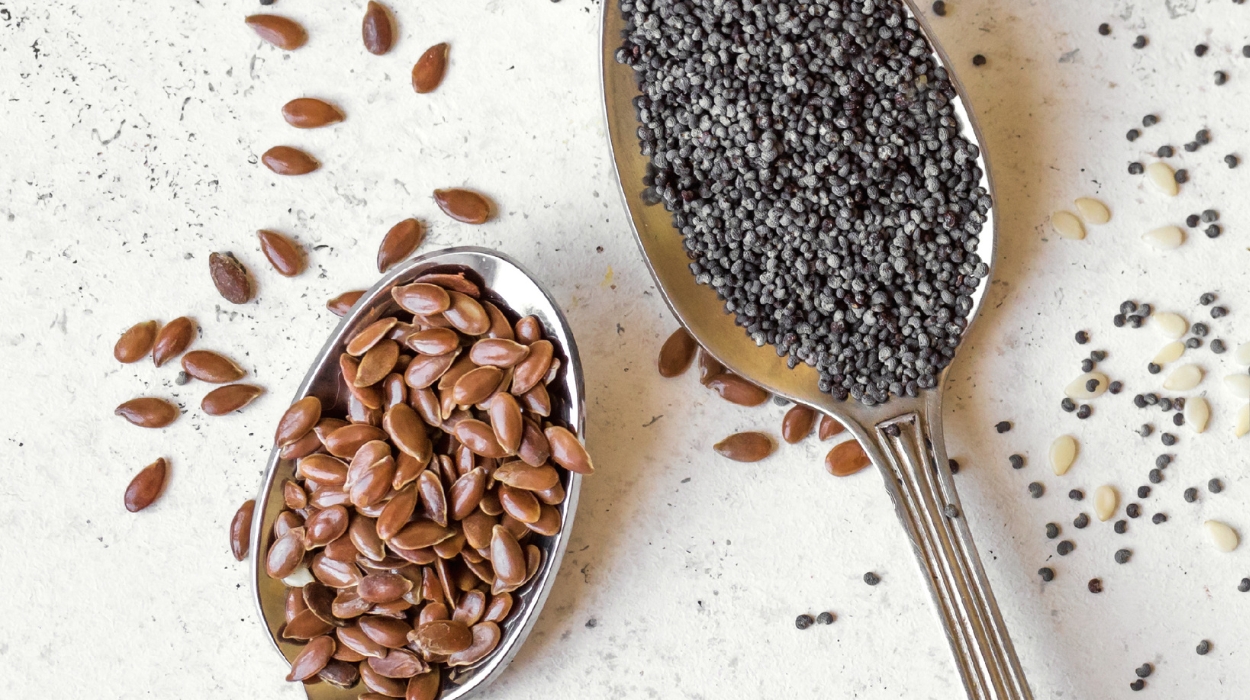 Expert's opinion
Expert's opinion
Expert's opinion
The article is a subjective view on this topic written by writers specializing in medical writing.
It may reflect on a personal journey surrounding struggles with an illness or medical condition, involve product comparisons, diet considerations, or other health-related opinions.
Although the view is entirely that of the writer, it is based on academic experiences and scientific research they have conducted; it is fact-checked by a team of degreed medical experts, and validated by sources attached to the article.
The numbers in parenthesis (1,2,3) will take you to clickable links to related scientific papers.
Chia Seeds Vs Flax Seeds: Which Is Healthier?

In recent years, the health and wellness community has developed a great interest in foods that offer numerous nutritional benefits. Among the most popular choices are chia and flax seeds. These seeds have gained significant attention for their health benefits and culinary versatility. However, the question of which seed is superior has been debated among health enthusiasts.
This comprehensive guide delves into everything about healthy seeds for weight loss in 2023. We will compare and contrast information about chia seeds and flax seeds, their nutritional profiles, health benefits, and culinary uses. You will also learn about potential side effects to help you make an informed choice about incorporating them into your diet. Hopefully, after reading this piece, you can decide which seed is the right addition to your diet in 2023.
Differences Between Chia Seeds & Flax Seeds
Some differences between chia seeds and flax seeds are listed below.
- Chia seeds contain a slightly lower alpha-linolenic acid than flax seeds.
- Chia seeds contain a higher amount of fiber compared to flax seeds.
- Flax seeds have a shorter shelf life than chia seeds due to their higher fat content.
- Flax seeds have a slightly nutty flavor, while chia seeds have a more neutral taste.
Chia Seeds Vs. Flax Seeds: Nutrition Comparison
It is important to note that nutrient compositions of chia seeds vs flax seeds may vary slightly depending on the brand and source of the seeds. Nevertheless, below there is a list of the typical nutrient composition per 1 ounce (28 grams) of each seed.
| Flax Seeds | Chia Seeds | |
| Calories | 150 kcal | 138 kcal |
| Carbs | 8.2 g (7.6 g Fiber) | 12.3 g (11 g Fiber) |
| Protein | 5.2 g | 4.7 g |
| Fat (Mainly healthy omega-3 fatty acids) | 12 g | 8.6 g |
| Calcium | 60 mg | 179 mg |
| Iron | 1.3 mg | 2.2 mg |
| Magnesium | 77 mg | 95 mg |
| Phosphorus | 150 mg | 183 mg |
| Potassium | 115 mg | 115 mg |
What Are Chia & Flax Seeds?
Chia and flax seeds are two types of nutrient-dense, tiny seeds. However, their appearance, flavor, and source differ.
Chia seeds are derived from the Salvia hispanica plant native to Central and South America. Chia seeds were highly valued by ancient civilizations such as the Aztecs and Mayans[1] for their energy-boosting effect. On the other hand, flax seeds, also known as linseeds, are obtained from the flax plant (Linum usitatissimum). They have been used for centuries as both a food and a source of medicinal properties. They are small and flat, with a smooth and glossy appearance.
Similar Benefits Of Flax & Chia Seeds

Flax and chia seeds offer similar benefits due to their rich nutritional profiles. Here are some of the similar benefits you should know:
Boost Digestion
Both seeds are rich sources of dietary fiber, including insoluble and soluble fiber. Soluble fiber absorbs water and forms a gel-like substance in the digestive tract, while insoluble fiber adds bulk to the stool. For instance, the lignins in flaxseeds trigger mucus secretion, producing a laxative effect.
It is important to note that while both seeds can be beneficial for digestion, it is always a good idea to introduce them gradually into your diet. Also, drink plenty of water when consuming seeds, as their high fiber content may cause discomfort if consumed without adequate hydration. To understand possible consumption outcomes, you may read about chia seeds’ side effects.
Lower Risk Of Heart Disease
Both seeds are excellent sources of alpha-linolenic acid, an essential omega-3 fatty acid. Note that alpha-linolenic fatty acids are known for their heart-protective properties.[2] They help reduce inflammation, decrease triglyceride levels, and lower blood pressure. Omega-3 fatty acids can also be found in seafoods like fatty fish.
When comparing flax seeds to chia seeds, bear in mind they are both rich in antioxidants, such as lignans and polyphenols. These antioxidants help protect the heart by neutralizing harmful free radicals in the body, which causes oxidative stress. Thus, combating oxidative stress supports health benefits, such as reducing the risk of cardiovascular diseases.
Stabilize Blood Sugar
Chia and flax seeds are good sources of plant-based protein. Therefore, eating them can contribute to a gradual release of glucose into the bloodstream and prevent blood sugar spikes. Thus, many health professionals recommend chia seeds for weight loss due to their contribution to reducing blood sugar.
Glycemic index (GI) measures how quickly a food raises blood sugar levels. Conversely, foods with a low glycemic index are digested and absorbed more slowly, resulting in a more gradual and steady increase in blood sugar levels. Dry chia seeds have a glycemic index of 30, and flax seeds have a glycemic index 35, which are considered low. Thus, this contributes to their blood sugar benefit.
Flax Seeds Better Than Chia Seed, Or Not?
Choosing between flax and chia seeds depends on personal preference, dietary needs, and health goals. However, their nutritional profile differs slightly, giving one seed an advantage over the other, which is still based on individuals dietary needs.
Generally speaking, chia seeds have a higher amount of fiber compared to flax seeds. This makes them a beneficial addition for weight-loss enthusiasts. Additionally, you may read the Orgain protein powder review to better understand plant-based protein function in the body.
On the other hand, the flax seed is the richest dietary source of lignans. Importantly, this antioxidant compound has potential anti-cancer properties, reducing the rate of prostate and breast cancer. Research shows that the lignins in flaxseeds can change estrogen metabolism, which can be useful in treating breast cancer.
How To Eat Chia Seeds & Flax Seeds
Chia and flax seeds are ideal for almost every meal preparation. Here are some suggestions for eating both seeds.
Bear in mind that both seeds can be used in nearly the same food processes. However, it is generally recommended to consume ground flax seeds. Ground flax seeds enhance digestibility and nutrient absorption compared to whole flax seeds.[3]
- Pudding: Soak either of the seeds in a liquid of your choice, such as almond milk or coconut milk, overnight in the refrigerator. Chia seeds will absorb the liquid and create a gel-like consistency, due to the high amount of mucilage.[4] To enhance the chia pudding taste, you can add flavors like vanilla, cocoa powder, or fruit.
- Toppings: Sprinkle ground flaxseeds or chia seeds over your yogurt, cereals, oatmeal, or salads. This will contribute to the crunchy texture and boost the fiber content of your meal.
- Smoothies and Shakes: Add one or two tablespoons of flax seed powder or ground chia seed to your favorite smoothie recipe and blend together. They will blend in seamlessly and add a nutty flavor. You can also add them to protein shakes for an extra nutritional boost.
- Baking: You can substitute some baking flour with chia flour in muffins, bread, cookies, and pancakes. You can also choose chia seeds as an egg substitute in baking recipes.[5]
Mix one tablespoon of chia seeds with three tablespoons of water and let it sit for a few minutes. Once the mixture forms a gel-like consistency, use it as a replacement for egg in your baked goods. This is also a good alternative for vegans.
If you have any health condition that requires a strict diet or meal plan, we strongly recommend you consult professional healthcare. In addition, here are the best protein powders for sensitive stomachs: an effective solution to flax and chia seeds intolerance.
Conclusion
The benefits of chia seeds and flax seeds cannot be overemphasized, as they play a significant role in the human body. This is why concerned doctors and other health practitioners encourage people to incorporate both seeds into their meals. Fortunately, both seeds have versatile culinary properties. So you can be flexible with them as much as possible.
Frequently Asked Questions
While both seeds are popular foods with similar health benefits, they come from different plants.
Chia seeds are rich in fiber, which promotes the feeling of fullness and reduces appetite. Thus, they can help in weight management.
Both seeds intake can lead to digestive discomfort when consumed in excess amounts without sufficient hydration.
The frequency of using both seeds in cooking varies with personal preferences and dietary goals.
You can drink both seeds by incorporating them into beverages.
Both seeds are rich in dietary fiber. Meanwhile, fiber adds bulk to stool and helps in alleviating constipation or diarrhea.
While it’s relatively rare, some individuals’ bodies are sensitive or allergic to both seeds. If you belong to this category, you may experience symptoms such as swelling, hives, itching, digestive issues, or difficult breathing.
Chia seeds can be consumed at various ages, but ensure infants are ready for solid foods (usually six months from birth) before introducing the seeds in their diets. You may also consult a pediatrician for solid foods recommendations.
+ 5 sources
Health Canal avoids using tertiary references. We have strict sourcing guidelines and rely on peer-reviewed studies, academic researches from medical associations and institutions. To ensure the accuracy of articles in Health Canal, you can read more about the editorial process here
- Bruna de Falco, Amato, M. and Lanzotti, V. (2017). Chia seeds products: an overview. [online] 16(4), pp.745–760. doi:https://doi.org/10.1007/s11101-017-9511-7.
- NCCIH. (2023). 7 Things To Know About Omega-3 Fatty Acids. [online] Available at: https://www.nccih.nih.gov/health/tips/things-to-know-about-omega-fatty-acids.
- Medlineplus.gov. (2015). Healthy food trends — flaxseeds: MedlinePlus Medical Encyclopedia. [online] Available at: https://medlineplus.gov/ency/patientinstructions/000728.htm#:~:text=Ground%20flaxseeds%20are%20easiest%20to,through%20your%20digestive%20system%20undigested.
- Nuria Muñoz-Tebar, Carmona, M., Ortiz, G., Molina, A. and M.I. Berruga (2022). Chia Seed Mucilage Edible Films with Origanum vulgare and Satureja montana Essential Oils: Characterization and Antifungal Properties. [online] 12(2), pp.213–213. doi:https://doi.org/10.3390/membranes12020213.
- MMB (2020). Chia Seeds for an Egg. [online] Dickinson.edu. Available at: https://blogs.dickinson.edu/chemistryinthekitchen/2020/04/30/chia-seeds-for-an-egg/.



